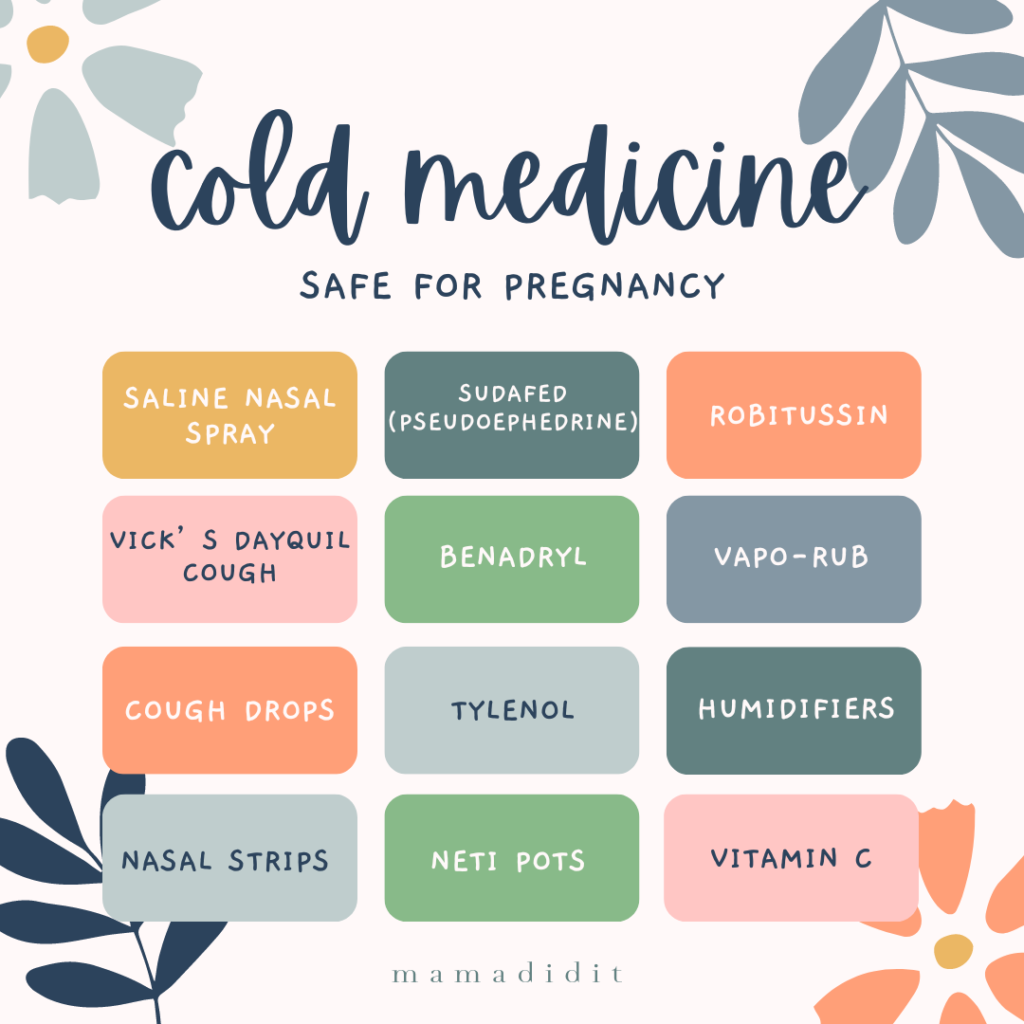While there are several off-limits medications while pregnant, there are certain cold decongestants that are safe for pregnancy. A birth nurse tells us exactly what’s recommended.
Pregnancy itself can bring with it stuffy sinuses thanks to the extra fluid we carry. Add in cold symptoms, and the sinus congestion can be downright miserable. But don’t give up hope. There are several options to help nasal congestion. Here are cold decongestants that are safe for pregnancy, plus natural remedies and what to avoid.
The Best Cold Decongestants that are Safe for Pregnancy
Though I’m a birth nurse and am quite familiar with recommendations, I went ahead and consulted Alabama Women’s Specialist OBGYNs to be sure I was up to date on my info. Here’s what they said is safe for their pregnant patients. Always follow the directions on the bottle for the proper use of decongestants.
1. Sudafed (pseudoephedrine):
A maximum-strength nasal decongestant that won’t cause drowsiness. Great for a work day where you need to breathe easier. Though the American College of Obstetrics and Gynecology (ACOG) deems Sudafed safe in pregnancy, it’s best to take it in the second and third trimesters.
2. Robitussin:
A great medication for relieving cough or symptoms due to other breathing issues like the common cold or bronchitis. This is another medication that is considered safe in pregnancy by the experts but it’s also recommended to use sparingly in the first trimester.
3. Vick’s Dayquil Cough:
A familiar brand used to treat cough, stuffy nose, body aches, and other symptoms (such as fever, headache, sore throat) caused by the common cold, flu, sinusitis, or bronchitis.
4. Benadryl (diphenhydramine):
Used to treat sneezing, runny nose, watery eyes, hives, skin rash, itching, and other cold or allergy symptoms. Because Benadryl is an anti-histamine, it may also relieve nasal congestion. Be aware that Benadryl makes many people sleepy. Don’t take it if you need to travel or be alert.
5. Clor-Trimenton:
This is another anti-histamine that works well to relieve symptoms of allergy, hay fever, and the common cold.
6. Mentholated Ointments (Vapor Rubs):
Mentholated ointments, commonly known as vapor rubs, can be applied topically to the chest or under the nose to relieve congestion. It’s important to choose products with natural ingredients and consult with a healthcare provider before use. While the use of vapor rubs is generally considered safe, moderation is key during pregnancy.
7. Menthol Cough Drops:
Cough drops are considered a safe cough suppressant for pregnancy. Some that include menthol can help you breathe a bit easier, temporarily reduce stuffiness, and even relieve a mild sore throat.
8. Acetaminophen:
Tylenol is one of the otc pain relievers (over the counter medications) considered safe for the pregnant woman. If you are experiencing not only nasal congestion but also mild aches or a low-grade fever, acetaminophen may be recommended by healthcare professionals. It is generally considered safe when used according to the recommended dosage. However, it’s crucial to consult with a healthcare provider before taking any medications during pregnancy.

Cold Decongestants that are Safe for Pregnancy
When picking out common decongestants like Sudafed or Robitussin, do stick to the recommendations. These brands may add extra medicines to make a “multi-symptom” formula. Check ingredients and stick to what’s recommended to avoid side effects for your baby. If you are unsure, always give your healthcare provider a call. And remember, these medications are for short-term use. If your symptoms last longer than a couple of days, call your doctor.
Off-Limits Cold Medications When Pregnant
It’s best to say no to these medications when pregnant because of the higher risk they pose. Always speak with your doctor or midwife before taking these or any medication, or herbs, during pregnancy. Even home remedies should be run by your doctor.
- 1. Phenylephrine (common nasal decongestant): Always check labels!
- 2. Nonsteroidal anti-inflammatory drugs (like Motrin/Ibuprofen/Aleve)
- 3. Aspirin
- 4. Mucinex (Guaifenesin) in the first trimester
It’s best to avoid these medications while pregnant because of the potential risks to your developing baby. Some of the active ingredients in these medications have been shown to have side effects or adverse effects for the unborn baby. We want to avoid any pregnancy complications. When in doubt about possible risks, give your healthcare provider a call.
Natural Methods to Fight the Common Cold in Pregnancy
Some expectant mothers choose to forego cold medicines altogether and embrace herbal remedies instead. The best options are at times to simply boost your own immune system. Here are some of the best frug-free options.
- Saline Nasal Sprays: One of the safest options for pregnant women dealing with nasal congestion is saline nasal sprays. These sprays contain a simple saline solution that helps moisturize the nasal passages, reduce inflammation, and clear mucus. Nasal spray clears the nasal passages and can help with stuffy nose. Since they are drug-free, saline nasal sprays pose minimal risk to both the mother and the baby.
- Steam Inhalation: A time-tested and natural remedy, steam inhalation can be highly effective in easing nasal congestion during pregnancy. Inhaling steam helps soothe irritated nasal passages and promotes easier breathing. Simply boiling water and inhaling the steam or using a humidifier in the bedroom can provide much-needed relief without any medication.
- Nasal Strips: Nasal strips are technically a type of decongestant because they open the nose a bit more, giving you more room to inhale and exhale. Sometimes this is needed. Since no medication is involved, these are safe for pregnant patients.
- Vitamin C chewables or tablets. Try to pick a non-GMO brand to get the best for your body.
- Zinc supplements. Check your prenatal vitamin for zinc. It’s recommended to get 12mg per day when you’re pregnant.
- Don’t forget your prenatal vitamin. It’s giving you an extra punch of nutrition.
- Homemade “Vapo-Rub”. Try adding a few drops of Eucalyptus Essential Oil to Coconut Oil. Use like you would Vapo-Rub.
- Neti-Pots: Great for clearing out the sinuses and giving you more room to breathe.
Cold Decongestants that are Safe for Pregnancy
Dealing with a cold during pregnancy can be challenging, but there are safe and effective ways to find relief without jeopardizing maternal or fetal health. From saline nasal sprays to steam inhalation and carefully chosen over-the-counter options, pregnant women have various alternatives to alleviate nasal congestion.
And as tough as it can be, hang in there! This will pass and you will soon breathe easier again. Best wishes to you!
You may also like 100 Cute Baby Captions for Instagram.

